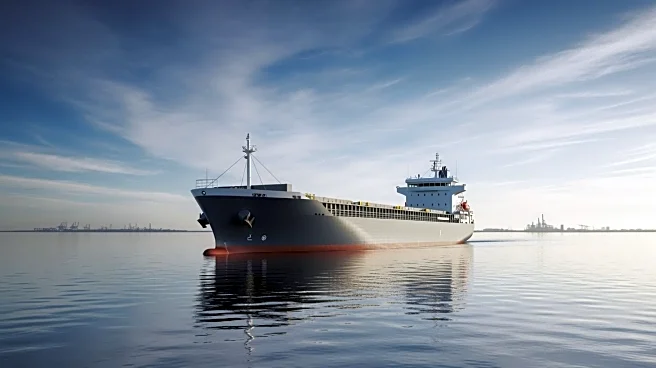What's Happening?
The Cyprus Union of Shipowners (CUS) has publicly opposed the International Maritime Organization's (IMO) Net Zero Framework (NZF), urging the Cypriot government and other EU member states to vote against
it. The NZF proposes a fee structure on carbon emissions to encourage the use of green fuels. However, the CUS argues that the framework poses a significant threat to the European shipping industry, economy, and energy security, particularly affecting small and medium-sized enterprises (SMEs). The association claims that the framework would impose a multi-billion-euro tax that shifts costs to consumers without effectively reducing emissions. The NZF aims to collect approximately $10 billion annually to fund low-emission ships, green fuel infrastructure, and research and development, while offsetting costs for vulnerable states. Critics, including the CUS, believe the framework diverts resources from genuine technological innovation, potentially leading to increased living costs and inflation.
Why It's Important?
The opposition from Cyprus' shipowners highlights the broader economic implications of the IMO's Net Zero Framework. If implemented, the framework could lead to increased operational costs for shipping companies, particularly smaller operators, who may struggle to absorb the fees and could be forced to raise rates. This could result in higher consumer prices and inflation, affecting the broader economy. The framework's impact on SMEs is particularly concerning, as these businesses may face financial strain, potentially leading to a reduction in the EU-linked fleet through sales and early scrapping. The debate underscores the challenges of balancing environmental goals with economic realities, as stakeholders weigh the costs and benefits of transitioning to greener shipping practices.
What's Next?
The Cyprus Union of Shipowners joins a growing list of opponents to the NZF, including the Trump administration, Saudi Arabia, and prominent oil tanker owners. On the other hand, supporters such as the International Chamber of Shipping, European Shipowners Associations, and the EU advocate for the framework, along with small island developing states concerned about rising sea levels. The IMO Secretary General, Arsenio Dominguez, acknowledges the framework's imperfections but argues it is preferable to fragmented regional regulations. The ongoing negotiations will determine whether the framework is adopted or revised, with potential implications for global shipping regulations and carbon emissions strategies.
Beyond the Headlines
The debate over the IMO's Net Zero Framework reflects broader tensions between environmental policy and economic interests. The framework's focus on carbon fees and green fuel incentives raises questions about the effectiveness of market-based solutions in driving sustainable practices. Critics argue that without sufficient availability of green fuels, the framework may not achieve its emissions reduction goals, highlighting the need for technological innovation and infrastructure development. The opposition from Cyprus' shipowners also points to the geopolitical dimensions of environmental regulation, as different countries and industries navigate the complexities of global climate policy.










